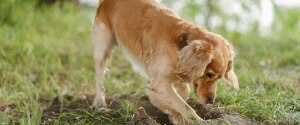
Digging is a natural instinct in dogs, with many dogs digging to find out what might be under a particularly good-smelling pile of dirt or to create a cool place to lay down on a hot day. But if your dog has started digging in your yard, you're probably less than thrilled. It can destroy your landscaping and can be a danger if your dog digs a hole to get under the fence or if someone steps in one. Find out more about why dogs dig and how to stop them in the details below.
Why Do Dogs Dig Holes?
Before you can start figuring out how to stop your dog from digging, you first have to figure out why he started digging in the first place. Some dogs dig just for the sheer enjoyment of it, but in many cases, there are some underlying reasons you may be unaware of.
1. Boredom
Boredom is one of the most common causes of problem behaviours in dogs, and digging is no exception. If your dog is left to his own devices out in the yard, chances are he will sniff around, maybe chase a squirrel or two and then possibly start digging. The issue here becomes that once your dog figures out that digging is fun and helps relieve that boredom, it's hard to stop the behaviour.
2. Instinct
While breed isn't everything for dogs, it can play a role in your dog's temperament and behaviour. Some breeds are just more prone to digging because they have been bred for that purpose, and it's a natural instinct for them. Terriers, for example, were bred to hunt small rodents that usually live underground, so these breeds may be more prone to digging.
3. There's Something Under There
While a dog doesn't necessarily have to have a reason to dig, many times they do. Remember that your dog can smell a lot more than you do, and a dog that has recently started digging or that seems to be digging in spots along a trail he is sniffing may be doing so because there is actually something under the ground. Dogs have a natural instinct to hunt, and if there are moles or other rodents in the ground, your dog may be trying to dig them out.
4. Comfort
If your dog is outside on a hot day, you may notice that he digs a hole in the ground to lie in. The reason is simple: The dirt is colder than the surface of the ground. Dogs may also dig to create a burrow they can hide in to feel safe or to stay warm if it's cold. If your dog seems to be digging to create a comfy spot, consider bringing him in on hot or cold days and providing a shaded spot.
5. Stress or Anxiety
Similar to digging out of boredom, dogs that are stressed or anxious may also dig as a way to stay busy and to relieve some of the negative feelings. If there have been any changes to your dog's life recently, such as a move, or he is prone to separation anxiety, you may see more digging.
How to Stop a Dog from Digging
If your dog's digging has turned from an occasional event to an ongoing problem, it's probably time to take some action. Here are five suggestions on how to stop your dog from digging.
1. Address Your Dog's Emotional State
If you think your dog is digging because of boredom, stress and/or anxiety, addressing this underlying cause is key to curbing the digging. Try to figure out what is stressing your dog or making him feel anxious. Does he not like to be left alone outside? Has he not made friends with the dog next door yet? Are there loud noises that are scaring him? Taking steps to help your dog feel safer and more secure can help reduce the urge to dig. Make sure to spend plenty of quality time with your dog and provide him with toys or things to do if he's outside. In more serious cases, you may have to bring your dog inside unless someone is out there to supervise and correct him when he starts to dig.
2. Provide Plenty of Exercise
The old saying is that "a tired dog is a good dog," and this is true. If your dog is already worn out, he will be less likely to dig. Most dogs need at least one half-hour walk daily, and high-energy breeds such as herding dogs and working dogs can demand much more. Experiment with how much walking and exercise your dog needs to stay happy and healthy, and remember that being left outside — even in a fenced-in yard — doesn't count as exercise. If walking in your area isn't feasible, a sustained game of fetch or intense obedience training session can work as well.
3. Take Care of the Pest Problem
If your dog is digging because there are pests under the ground and he is trying to hunt, the easiest solution is to just get rid of the pests. There are plenty of live traps on the market, and you can also get special rodent deterrents that emit a sound that humans can't hear but that is annoying for the rodents. You can also have a professional come out and remove the pests. However, always make sure to check and see if anything you are using is listed as safe for other animals.
4. Secure the Fence Line
It's common for dogs to dig around the fence line as a way to try to get out, but this is very unsafe for your dog. It can potentially have them out running on the street where they could be hit by a car, and it also means other dogs could get in your yard. To help keep your fence secure, consider burying the bottom edge of the fence in rocks.
A digging dog is a common problem, but with a little bit of understanding of the underlying factors and some proactive problem-solving, it is possible to stop your dog from digging.
Related articles



